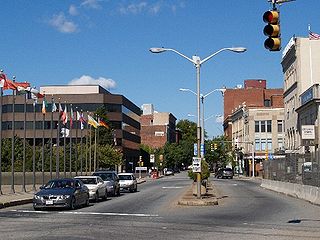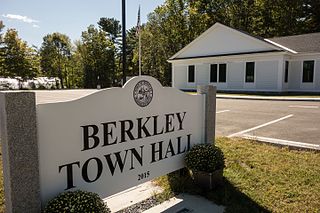
Berkley is a town in Bristol County, Massachusetts, United States, located south of Boston and east of Providence, Rhode Island. The population was 6,411 at the 2010 census, making it the least populated town in the county.
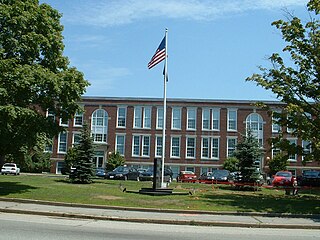
Dartmouth is a coastal town in Bristol County, Massachusetts, and was the first area of Southeastern Massachusetts settled. Dartmouth itself is part of the Farm Coast New England comprising a chain of historic coastal villages, vineyards and farms. June 8, 2014 marked the 350th year of Dartmouth's incorporation. It is also part of the Massachusetts South Coast. The local daily newspaper is "The Dartmouth Chronicle" and "Dartmouth Weekly".

Lakeville is a town in Plymouth County, Massachusetts, United States. The population was 10,602 at the 2010 census.

Wakefield is a town in Middlesex County, Massachusetts in the Greater Boston metropolitan area, incorporated in 1812 and located about 12.5 mi (20.1 km) north-northwest of Downtown Boston. The 73rd most populous municipality in Massachusetts, Wakefield's population was 24,932 at the 2010 census, with a 2016 population estimate of 26,399.
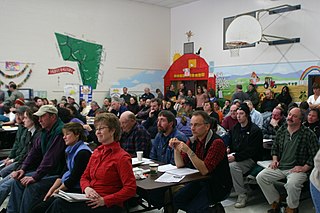
A town meeting is a form of direct democratic rule, used primarily in portions of the United States – principally in New England – since the 17th century, in which most or all the members of a community come together to legislate policy and budgets for local government. This is a town- or city-level meeting where decisions are made, in contrast with town hall meetings held by state and national politicians to answer questions from their constituents, which have no decision-making power.

The Taunton River, is a river in southeastern Massachusetts in the United States. It arises from the confluence of the Town River and Matfield River, in the town of Bridgewater. From there it meanders through the towns of Halifax, Middleborough and Raynham, through the city of Taunton for which it is named, the towns of Berkley, Dighton, Somerset, and the Assonet section of Freetown, to Fall River where it joins Mount Hope Bay, an arm of Narragansett Bay.
Apponequet Regional High School opened September 21, 1959, and serves secondary academic education students from the towns of Freetown, Assonet, and Lakeville, Massachusetts.
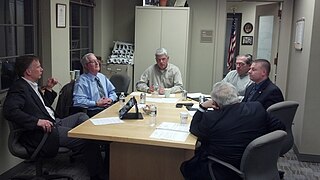
The board of selectmen or select board is commonly the executive arm of the government of New England towns in the United States. The board typically consists of three or five members, with or without staggered terms. Three is the most common number, historically. In some places, a first selectman is appointed to head the board, often by election.

The Assonet River is located in Bristol County, Massachusetts. It flows 7.4 miles (11.9 km) in a westerly direction through Freetown and joins the Taunton River near Assonet Neck in Berkley, Massachusetts.

East Freetown is one of two villages in the town of Freetown, Bristol County, Massachusetts, United States. Added to the town in 1747, East Freetown was originally an outpost settlement of Tiverton, Rhode Island, then a part of Massachusetts. It rests on the shore of Long Pond.

The Freetown-Fall River State Forest is a publicly owned forest covering more than 5,000 acres (2,000 ha) in the city of Fall River and the towns of Freetown and Lakeville in the state of Massachusetts. The forest lies mostly in the center of the town of Freetown dividing Assonet, East Freetown, and Fall River's northern most boundary. The forest land includes Profile Rock, a granite outcropping which local Native Americans believe to be the image of Chief Massasoit, and a 227-acre (92 ha) Wampanoag reservation. The forest is owned by the Commonwealth of Massachusetts and operated by the Department of Conservation and Recreation with headquarters in Assonet.
Mark A. Howland is a former representative to the Massachusetts General Court from New Bedford, Massachusetts.

Massachusetts's fifteenth congressional district is an obsolete district. It was also for a short time in the early 19th century a Massachusetts District of Maine. It was eliminated in 1943 after the 1940 Census. Its last location was in eastern Massachusetts at Cape Cod. Its last Congressman was Charles L. Gifford, who was redistricted into the ninth district.

James Buffington was a member of the United States House of Representatives from Massachusetts. He was born in Fall River on March 16, 1817. He attended the common schools, and Friends College in Providence, Rhode Island. He studied medicine but never practiced, then engaged in mercantile pursuits. He was a member of the Fall River Board of Selectmen from 1851 to 1854, and served as the first Mayor of Fall River under the new city government from 1854 to 1855. He was elected as a candidate of the American Party to the Thirty-fourth Congress and as a Republican to the three succeeding Congresses. Buffington was chairman of the Committee on Accounts, and the Committee on Military Affairs.
Not to be confused with contemporary poet Joshua Gage
The Town Manager of Saugus, Massachusetts, is the chief administrative manager of Saugus, Massachusetts. Saugus has a Town Manager/Representative town meeting system of government. The Town Manager’s Office is located in Saugus Town Hall. Scott Crabtree has been town manager since March 30, 2015 and previously held the position from 2012 to 2014.
